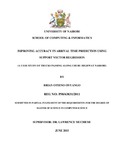| dc.description.abstract | Travel time prediction is vital to the development of reliable travel information systems. In this research project, Support vector regression (SVR) algorithms is applied to develop travel-time prediction model and show that it can lower the prediction error with the use of correct parameter choice and improve the accuracy of the prediction model as measured through the use of RMSE and MAPE. The purpose of this research project was to create a model that will predict the vehicle arrival time between two clearly defined sets of road locations. It was demonstrated that the feasibility of applying SVR algorithm in developing a travel-time prediction model performs well for travel time predictions. A simple web based system prototype was built to demonstrate how the results can be used to implement a working system for everyday traffic consumption.
A case study was designed in which over 4000 datasets across five sections was collected during the study period along Uhuru Highway, Nairobi, Kenya. Taking into account the controlled movements and stops of trucks, the mechanism of travel time prediction proposed in this study uses data mobility-coordinates with timestamp to learn then estimate the time a truck will arrive at a given predefined location given the time and place of departure.
The developed time predictions model demonstrates much success in estimating truck arrival time for the sections under study and performs much better on average compared to linear regression across the five sections tested. The model is able to predict arrival time to within 2 minutes accuracy and averaged 18.01% in RMSE error across the five sections of study. On average a MAPE of less than 1% across the five sections was achieved as well. Zegeye and Null researched on the use of dynamic artificial neural network travel time prediction model for buses using only GPS data in Brazil and got an average MAPE result of 18.3% (Zegeye & Nall, 2014). In 2003, Wei and co researched on the use of SVR for travel time prediction for long distance travel along a freeway and averaged 13.91% in RMSE (Wei, Wu, Ming-Hua , Chang, & Ho, 2003).
The exploration of three different predictive algorithms i.e. RBF, linear SVR and linear regression provide the research with alternative models that can be adopted for each sections. On average the RBF kernel algorithm (SVR) preformed much better compared to the other two models across the five sections. The web based applications used as prototype to demonstrate the applicability of this project makes a strong case that this project can be presented as a commercial venture | en_US |

